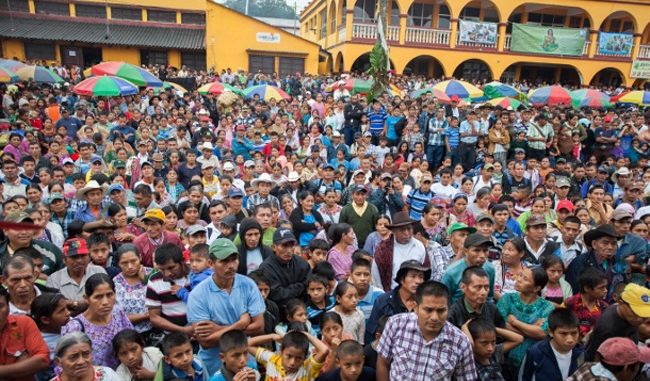

On June 2, Guatemalan police and military carried out the eviction of Q’eqchi Maya residents of the community of Laguna Larga in the Laguna de Tigre region of the country. Days later, the refugees from the eviction arrived in the Mexican state of Campeche.
The refugees formed a camp five kilometers from the border with Guatemala. The situation has been called a humanitarian emergency by migration activists in Mexico and Guatemala.
The eviction of this indigenous community points to how extractivism and neoliberal environmentalism are key causes of migration and land conflicts in the region.
“These are the conditions that allow us to speak of a humanitarian emergency, which endangers the lives and integrity of girls, boys and, in general, of women and all the people there,” wrote representatives from four migration collectives in Mexico, including Voces Mesoamericanas and La 72, Hogar Refugio para Personas Migrantes, in a statement to the press.
“It is a precarious camp,” the statement continued, “installed since June 2 by the people of the displaced community with what they have had on hand, mainly nylon bags as the only roof during the rainy season, and where they have received mainly solidarity from nearby communities.”
“Neither the Government of Mexico nor the Government of Guatemala have provided sufficient resources to alleviate the unworthy condition of the camp,” they added, “putting at risk the health and life, especially of the most vulnerable population.”
The eviction operation reportedly included over 1,500 members of the police and the military. Accounts vary on the number of families evicted, with Guatemalan National Newspaper Prensa Libre reporting 230 individuals being evicted. Independent media reports this number could reach as high as 700, and include primarily women, children, and elderly.
Other indigenous communities in the region still face the threat of eviction.
Neoliberal Environmentalism
Guatemala’s National Council of Protected Areas (CONAP) accused the families of usurping the land in the protected forests. But as Luis Solano, an investigator for the Guatemalan magazine, El Observador, points out, the evictions are more about business interests in the region than about protecting the environment.
“For many years there have been an entrance into the region by Guatemala’s most powerful economic interests in order to protect the archaeological sites, and promote tourism there,” Solano said. “These groups work with CONAP, the Ministry of the Environment and Natural Resources (MARN), and various Non-Governmental Organizations to protect the region, and to construct their grand tourism and archaeological projects there.”
“They have realized that communities have formed in these regions, and for them it is a threat,” Solano adds. “It is here where the orders for the eviction come from.”
According to Solano, the colonization of Northern Petén began decades prior to the establishment of the protected areas. In the 1960s, the first families made their way into the jungles to settle the land. This colonization was supported by the Guatemalan government in response to illegal logging by Mexican firms.
The establishment of the protected areas in Northern Petén did not occur until 1989, and led to the creation of the Lacandon, the Maya Biosphere, and Laguna del Tigre protected areas. The communities that were already established within these regions were then threatened with evictions.
The expansion of agro-industry drives farmers deeper and deeper into the protected areas, and the crisis in the Laguna del Tigre region has been marked by the presence of petroleum interests.
The protection of the forests is also being militarized. In 2011, Guatemalan President Álvaro Colom established the military unit referred to as the Green Battalion to combat illegal settlements and the destruction of forests in the region around Laguna del Tigre.
“The communities that are within the Laguna del Tigre are between several problems that intersect all at once in this park,” said Solano. “On one side, there is no agrarian politics in the country that allow these communities to have the rights to the land in order to live and survive. On the other side are the state institutions that operate there not only under the law of protected areas, but also on behalf of economic and extra-economic interests that operate there. These are the interests that the state forces respond to, such as the oil interests in the region.”
Continuation of Land Conflicts and Migration

The discourse of migration to the United States generally leaves out the process of internal migration. The dispossession of land for corporate interests leaves campesinos without land. It also means the loss of the control of means of production. As a result, the eviction in the Petén highlights one of the forces that drives both internal and external migration.
“If [small farmers] cannot find the means of survival [in Guatemala], then they have to look outside the country,” said Solano.
The rise of export crops such as sugar cane and African palm oil, as well as mining and large-scale hydro-energy interests, have led to the rapid re-concentration of lands into the hands of a few wealthy land owners. It is now estimated that 83 percent of arable lands in Guatemala is controlled by roughly three percent of the population.
“In the last years, the number of extractive projects have increased exponentially,” Enrique Vidal Olascoaga of Voces Mesoamericanas, a group of activists focused on migration research, told Toward Freedom. “We recognize now, that more than ever, the extractive model from the United States and Canada is one of the principal causes of the internal and external displacement and expulsion of people.”
“For example, mining projects, hydro-electric, and monoculture have become far worse in the last seven years, since the beginning of the free trade agreements,” Olascoaga explains. “Together with historic discrimination against indigenous peoples, campesinos, and people of African descent, there is a convergence of this violence within migration.”
Addressing Poverty Through Land Rights
Since the Spanish invasion in 1524, Guatemala’s indigenous peoples have suffered massive dispossession of territory. The best lands were taken for the production of export crops. This dispossession intensified following the liberal reforms of 1871, which spurred the arrival of thousands of Germans and Italians interested in the production of coffee. By the early 20th century, US-based companies such as United Fruit Company began to arrive due to the region’s potential for the production of bananas. By the 1940s, the United Fruit company had gained significant influence, and even controlling the country’s railroads.
The eviction in the Petén comes as left-wing members of the Guatemalan Congress have proposed a return of decree 900 to provide lands to the country’s small scale farmers. The decree is modeled on the agrarian reform of the revolutionary Guatemalan government of President Jacobo Árbenz in 1952.
The current members of the leftist Covergencia party made the proposal for land redistribution in response to high levels of extreme poverty in Guatemala, and argued that resolving the land issue would resolve the problems of poverty.
“There is no politics over land,” explains Solano. “The current system focuses on land as a market, and there is no distribution of lands to farmers. It is difficult for the campesino populations to gain access to the land with the current system.”
“The campesinos receive no support for the state,” he adds. “They are abandoned.”
—
Jeff Abbott is an independent journalist currently based out of Guatemala. He has covered human rights and social moments in Central America and Mexico. His work has appeared at VICE News, Truthout, the North American Congress on Latin America, and The Progressive. Follow him on twitter @palabrasdeabajo
Source
Language of the news reported
Related content:
Copyright © da fonte (mencionado acima). Todos os direitos reservados. O Land Portal distribui materiais sem a permissão do proprietário dos direitos autorais com base na doutrina de “uso justo” dos direitos autorais, o que significa que publicamos artigos de notícias para fins informativos e não comerciais. Se você é o proprietário do artigo ou relatório e gostaria que ele fosse removido, entre em contato conosco pelo endereço hello@landportal.info e removeremos a publicação imediatamente.
Várias notícias relacionadas à governança da terra são publicadas no Land Portal todos os dias pelos nossos usuários, partindo de várias fontes, como organizações de notícias e outras instituições e indivíduos, representando uma diversidade de posições sobre cada tópico. Os direitos autorais estão na origem do artigo; a fundação não tem o direito legal de editar ou corrigir o artigo, nem endossar o seu conteúdo. Para fazer correções ou solicitar permissão para republicar ou outro uso autorizado deste material, entre em contato com o detentor dos direitos autorais.
